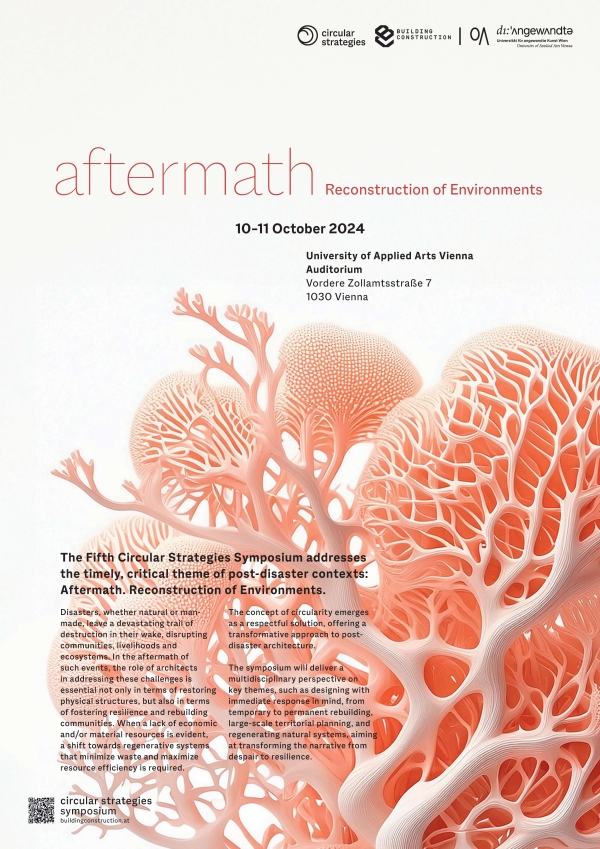I oA institute of architectureThursday, October 10th 2024 | 6:00 pm
Welcome Address:
Petra Schaper Rinkel, Rector of the University of Applied Arts Vienna.
Introduction:
Petra Gruber, Institute of Architecture, University of Applied Arts Vienna
Keynote: “Ruins
and Regeneration: The Near and Far Future of Disaster Recovery” by Eric J. Cesal (Instructor, Harvard Global Development Program,
community-based responses to disaster).
Friday, October
11th 2024 | 9:00 am - 6:30 pm
The symposium will be organized around four conversation
topics: “On the ground”, “From temporary to permanent”, “Large-scale reconstruction”, and “Material and approaches”. The conversations
will be moderated by Anja Jonkhans, Thomas Romm, and Carmen Maria Egger.
Guest
lectures and panelists: Patrick Coulombel (Emergency Architects Foundation, France), Cyrille Hanappe (Director "Architecture
& Major Risks" ENSAPB, ENSA Paris Belleville, AIR Architecture, France), Cecilia Schmölzer (Emergency shelter and reconstruction
expert, Red Cross), Natalie Mossin and Ingeborg Hau (Head of Institute and Curator of the Royal Danish Academy, Denmark),
Hsieh Ying Chun (Atelier-3, Taiwan), Vitalina Hoshovska (Balbek Bureau, Ukraine), Robert Sakic Trogrlic and Michaela Bachmann
(IIASA, Austria), Kees Christiaanse (President Swiss Network with Ukraine, ETH Zurich, KCAP, the Netherlands), Lilet Breddels
(Director of Archis Amsterdam and project manager at Ro3kvit, urban coalition for Ukraine, the Netherlands), Adam Przywara
(Post-doctoral Researcher, University of Fribourg, Switzerland), Mattia di Carlo (Circular Expert, 3XN GXN, Denmark).
Organized by Petra Gruber and Camille Breuil, Department of Building Construction,
I oA, University of Applied Arts Vienna.
The fifth Circular Strategies Symposium
addresses the timely, critical theme of post-disaster contexts: Aftermath. Reconstruction of Environments.
Disasters, whether natural or manmade, leave a devastating trail of destruction in their wake, disrupting communities,
livelihoods and ecosystems. In the aftermath of such events, the role of architects in addressing these challenges is essential
not only in terms of restoring physical structures, but also in terms of fostering resilience and rebuilding communities.
When a lack of economic and/or material resources is evident, a shift towards regenerative systems that minimize waste and
maximize resource efficiency is required. The concept of circularity emerges as a respectful solution, offering a transformative
approach to post-disaster architecture.
The symposium will deliver a multidisciplinary
perspective on key themes, such as designing with immediate responses in mind, from temporary to permanent rebuilding, large-scale
territorial planning, materials and approaches, aimed at transforming the narrative from despair to resilience.




